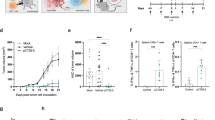Abstract
Background
Vaccines capable of inducing CD8 T cell responses to antigens expressed by tumor cells are considered as attractive choices for the treatment and prevention of malignant diseases. Our group has previously reported that immunization with synthetic peptide corresponding to a CD8 T cell epitope derived from the rat neu (rNEU) oncogene administered together with a Toll-like receptor agonist as adjuvant, induced immune responses that translated into prophylactic and therapeutic benefit against autochthonous tumors in an animal model of breast cancer (BALB-neuT mice). DNA-based vaccines offer some advantages over peptide vaccines, such as the possibility of including multiple CD8 T cell epitopes in a single construct.
Materials and methods
Plasmids encoding a fragment of rNEU were designed to elicit CD8 T cell responses but no antibody responses. We evaluated the use of the modified plasmids as DNA vaccines for their ability to generate effective CD8 T cell responses against breast tumors expressing rNEU.
Results
DNA-based vaccines using modified plasmids were very effective in specifically stimulating tumor-reactive CD8 T cell responses. Moreover, vaccination with the modified DNA plasmids resulted in significant anti-tumor effects that were mediated by CD8 T cells without the requirement of generating antibodies to the product of rNEU.
Conclusions
DNA vaccination is a viable alternative to peptide vaccination to induce potent anti-tumor CD8 T cell responses that provide effective therapeutic benefit. These results bear importance for the design of DNA vaccines for the treatment and prevention of cancer.






Similar content being viewed by others
Abbreviations
- rNEU:
-
rat neu oncogene
- TLR:
-
Toll-like receptor
References
Buteau C, Markovic SN, Celis E (2002) Challenges in the development of effective peptide vaccines for cancer. Mayo Clinic Proc 77:339–349
Guy C, Webster M, Schaller M, Parsons T, Cardiff R, Muller W (1992) Expression of the neu protooncogene in the mammary epithelium of transgenic mice induces metastatic disease. Proc Natl Acad Sci USA 89:10578–10582
Lucchini F, Sacco MG, Hu N, Villa A, Brown J, Cesano L, Mangiarini L, Rindi G, Kindl S, Sessa F, et al (1992) Early and multifocal tumors in breast, salivary, harderian and epididymal tissues developed in MMTY-Neu transgenic mice. Cancer Lett 64:203–209
Boggio K, Nicoletti G, Di Carlo E, Cavallo F, Landuzzi L, Melani C, Giovarelli M, Rossi I, Nanni P, De Giovanni C, Bouchard P, Wolf S, Modesti A, Musiani P, Lollini PL, Colombo MP, Forni G (1998) Interleukin 12-mediated prevention of spontaneous mammary adenocarcinomas in two lines of Her-2/neu transgenic mice. J Exp Med 188:589–596
Quaglino E, Iezzi M, Mastini C, Amici A, Pericle F, Di Carlo E, Pupa SM, De Giovanni C, Spadaro M, Curcio C, Lollini PL, Musiani P, Forni G, Cavallo F (2004) Electroporated DNA vaccine clears away multifocal mammary carcinomas in her-2/neu transgenic mice. Cancer Res 64:2858–2864
Rovero S, Amici A, Carlo ED, Bei R, Nanni P, Quaglino E, Porcedda P, Boggio K, Smorlesi A, Lollini PL, Landuzzi L, Colombo MP, Giovarelli M, Musiani P, Forni G (2000) DNA vaccination against rat her-2/Neu p185 more effectively inhibits carcinogenesis than transplantable carcinomas in transgenic BALB/c mice. J Immunol 165:5133–5142
Nava-Parada P, Forni G, Knutson KL, Pease LR, Celis E (2007) Peptide vaccine given with a Toll-like receptor agonist is effective for the treatment and prevention of spontaneous breast tumors. Cancer Res 67:1326–1334
Lachman LB RX, Kremer RH, Ozpolat B, Kiriakova G, Price JE (2001) DNA vaccination against neu reduces breast cancer incidence and metastasis in mice. Cancer Gene Ther 8:259–268
Miller FR, Miller BE, Heppner GH (1983) Characterization of metastatic heterogeneity among subpopulations of a single mouse mammary tumor: heterogeneity in phenotypic stability. Invasion Metastasis 3:22–31
Spadaro M, Ambrosino E, Iezzi M, Di Carlo E, Sacchetti P, Curcio C, Amici A, Wei WZ, Musiani P, Lollini PL, Cavallo F, Forni G (2005) Cure of mammary carcinomas in Her-2 transgenic mice through sequential stimulation of innate (neoadjuvant interleukin-12) and adaptive (DNA vaccine electroporation) immunity. Clin Cancer Res 11:1941–1952
Shimonkevitz R, Kappler J, Marrack P, Grey H (1983) Antigen recognition by H-2-restricted T cells. I. Cell-free antigen processing. J Exp Med 158:303–316
Piechocki MP, Pilon SA, Wei WZ (2002) Quantitative measurement of anti-ErbB-2 antibody by flow cytometry and ELISA. J Immunol Methods 259:33–42
Spadaro M, Ambrosino E, Iezzi M, Di Carlo E, Sacchetti P, Curcio C, Amici A, Wei W-Z, Musiani P, Lollini P-L, Cavallo F, Forni G (2005) Cure of mammary carcinomas in Her-2 transgenic mice through sequential stimulation of innate (neoadjuvant interleukin-12) and adaptive (DNA vaccine electroporation) immunity. Clin Cancer Res 11:1941–1952
Gallo P, Dharmapuri S, Nuzzo M, Maldini D, Cipriani B, Forni G, Monaci P (2007) Adenovirus vaccination against neu oncogene exerts long-term protection from tumorigenesis in BALB/neuT transgenic mice. Int J Cancer 120:574–584
Rolla S, Nicolo C, Malinarich S, Orsini M, Forni G, Cavallo F, Ria F (2006) Distinct and non-overlapping T cell receptor repertoires expanded by DNA vaccination in wild-type and HER-2 transgenic BALB/c mice. J Immunol 177:7626–7633
Curcio C, Di Carlo E, Clynes R, Smyth MJ, Boggio K, Quaglino E, Spadaro M, Colombo MP, Amici A, Lollini PL, Musiani P, Forni G (2003) Nonredundant roles of antibody, cytokines, and perforin in the eradication of established Her-2/neu carcinomas. J Clin Invest 111:1161–1170
Whitton JL, Sheng N, Oldstone MB, McKee TA (1993) A “string-of-beads” vaccine, comprising linked minigenes, confers protection from lethal-dose virus challenge. J Virol 67:348–352
Acknowledgments
This work was supported by NIH grants R01CA103921, R01CA80782, and P50CA91956.
Author information
Authors and Affiliations
Corresponding author
Additional information
This article is a symposium paper from the conference “Progress in Vaccination against Cancer 2007 (PIVAC 7),” held in Stockholm, Sweden, on 10–11 September 2007.
Rights and permissions
About this article
Cite this article
Cho, HI., Niu, G., Bradley, N. et al. Optimized DNA vaccines to specifically induce therapeutic CD8 T cell responses against autochthonous breast tumors. Cancer Immunol Immunother 57, 1695–1703 (2008). https://doi.org/10.1007/s00262-008-0465-x
Received:
Accepted:
Published:
Issue Date:
DOI: https://doi.org/10.1007/s00262-008-0465-x




